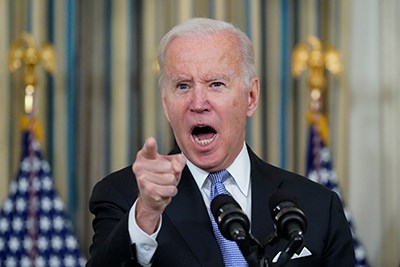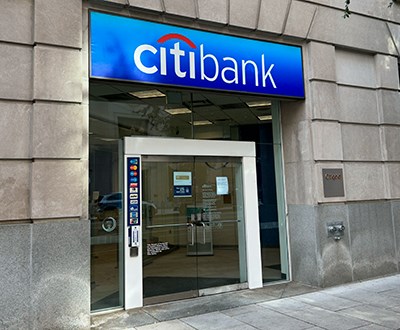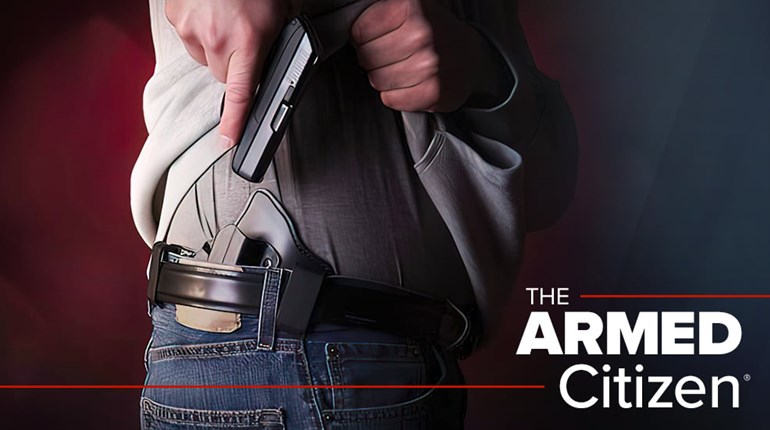
First came the Clinton administration-era lawsuits. And gun makers were almost bled dry. Until the PLCAA was passed and signed by President George W. Bush in 2005. Then came the Obama administration’s Operation Choke Point in 2013. And the financial-services sector was used to strangle gun makers and dealers. Until the Trump administration ended that policy. Now has come ESG and the Biden administration’s war on gun makers and dealers. And what’s to come of all of this?
In the last days of the Trump administration, on Jan. 14, 2021, the Office of the Comptroller of the Currency (OCC) approved a new rule called “Fair Access to Bank Services, Capital and Credit.”
According to the OCC press announcement at the time: “[T]he rule codifies more than a decade of OCC guidance stating that banks should conduct risk assessment of individual customers, rather than make broad-based decisions affecting whole categories or classes of customers, when provisioning access to services, capital, and credit. …” The press release also said this rule should assure “fair access to financial services, and fair treatment of customers.”
The rule was written to apply to the largest banks—those with more than $100 billion in assets—but then, on Jan. 28, 2021, after control of the OCC was turned over from the Trump administration to the Biden administration, the OCC announced that the fairness rule would be left in place, but not published to the Federal Register; therefore, it would not be official law until the new administration completed a review of the rule.
An original April 1, 2021, enforcement date of the rule came and went. In the almost two years since, the possibility of financial discrimination against politically undesirable industries, including the firearms industry, oil, gas, coal and nuclear energy, as well as other industries like tobacco and incarceration, have continued.
Most recently, private-sector ESG (environmental, social, governance) policies have been used by major companies, such as BlackRock, which is an investment company that manages around $10 trillion, to shun “politically incorrect” industries much like “Operation Choke Point” had once been designed to do.
When addressing this issue, Sen. Dan Sullivan (R-Alaska) said that the “sheer power that is consolidated among the three firms” BlackRock, Vanguard and State Street has caused “massive distortion in our public markets.” According to The Wall Street Journal, those three firms control $20 trillion in investment dollars. These investment companies have largely been given the voting power of the shares they manage. This has given these financial companies a lot of power with corporate boards and, therefore, a real ability to influence corporate policies. At the same time, other private-sector, financial-services companies, such as some large banks, have used ideological rationales to deny firearms companies services.
Basically, gun-control groups and other social activists have sought to find ways to influence business policy by getting banks and financial institutions to stop doing business with companies or persons they do not approve of. Some of these activists seek to influence banks and other institutions into further shunning gun makers and dealers.
The weaponization of the banking industry against the firearms industry went big in 2013. During the Obama administration, banking regulators ostensibly seeking to support an “anti-crime” agenda instituted Operation Choke Point. Operation Choke Point operated on the theory that restricting access to banking services would help starve, for example, Mexican drug cartels of money and supplies.
This was an interesting—to be kind—excuse for a bad policy; after all, just a few years before federal bank regulators were implementing Operation Choke Point, another government-agency operation, run by the Bureau of Alcohol, Tobacco, Firearms and Explosives (ATF), and called “Operation Fast and Furious,” had blown up in scandal. This operation, begun in 2009, was a deliberate strategy by the Obama administration. It allowed about 2,000 firearms to go to the arsenals of drug cartels in Mexico. During this scandalous operation, the ATF allowed known straw purchasers to buy guns at U.S. firearms dealers and then allowed these criminals to “walk” these guns across the border into Mexico. The ATF says it was hoping to trace criminal activity that would implicate the Mexican drug cartels. This operation was exposed in congressional investigations—and thanks to multiple whistleblowers—after Dec. 15, 2010, when U.S. Border Patrol agent Brian Terry, a 40-year-old former U.S. Marine, was killed in a shootout with drug runners; two of the guns involved in Terry’s murder were traced to the ATF’s Operation Fast and Furious.
So using the excuse that they needed Operation Choke Point to impact Mexican drug cartels took some gall from the Obama administration. As the Obama administration saw it, however, this latest operation was a useful way to financially harm gun makers and dealers, since they had been unable to get gun-control legislation through Congress.
During Operation Choke Point, as the banking system analyzed the money moving through this supply chain, it became increasingly difficult for banks and financial-services companies to work with the gun industry, as doing so could bring the ire of federal banking regulators. As bankers tend to be extremely risk-averse, some began canceling business relationships with companies in the gun industry. Basically, bankers decided that the best way not to face questions from federal regulators was not to do business with firearms-related businesses, even though these gun companies were perfectly legitimate businesses making legal products for millions of law-abiding Americans.
This induced discriminatory behavior was finally stopped, thanks to a lot of work from NRA and others, via a corrective notice by banking regulators in 2015 telling them that they could not discriminate against firearms companies simply out of imaginary caution. Problem solved—well, not quite.
 Gun-Control Activists Try a New Approach
Gun-Control Activists Try a New Approach
Gun-control activists would soon step in to privatize the discriminatory practices against the gun industry with so-called ESG policies. ESG is a corporate catchphrase that packs together political agendas, which often includes gun control. Pressure from activists from outside corporations—and sometimes from inside—push ESG policies on major financial firms. Some financial companies that incorporate ESG policies have even used their influence to impact votes on boards of directors in order to force companies to comply to ESG criteria. This politically correct pressure can convince cautious executives in the banking industry to give in.
So, while the formal days of Operation Choke Point are gone, under ESG, activists now advocate for the social change they desire by prodding banks into avoiding business relationships with, for example, firearms-related industries. Like the earlier Operation Choke Point, these polices can be used to disregard the fact that these ESG policies are affecting legitimate businesses that make and sell legal products that are very often used for self-defense.
Banks that institute ESG policies, for example, might terminate business relationships or refuse to open commercial accounts for “undesirable” industries, including firearms manufacturers and retailers. These denials are often deliberately undocumented. Often this denial comes down to a branch manager making a policy decision that may or may not have been asked for by higher- ups in the bank—some are activists, while others are simply acting out of caution.
According to the National Shooting Sports Foundation (NSSF): “Corporate banks, including international giants Bank of America, JP Morgan Chase, Citigroup and Wells Fargo, continue to hold discriminatory policies that exclude the constitutionally protected firearm industry. These corporations refuse financial services to businesses ranging from major manufacturers to mom-and-pop retailers.”
These policies can potentially make it more difficult for people to find and purchase firearms. They can also make guns more expensive, as gun makers and dealers might not be able to get competitive rates on loans and more. These impacts can be difficult to quantify for consumers, but they are real.
This leads to a forward-looking question: Are these ESG practices sustainable in the political and economic environment of 2022 and beyond? Perhaps not.
 Seeking Asset Quality
Seeking Asset Quality
Quality is king in banking. Quality means clients that have solid businesses that pay their debts and keep their cash deposited in the bank. The attractiveness of ESG investing sometimes wanes in this regard. When you look deeply, things like “green technology” can be riskier forms of investments. Many of these “environmental” industries rely heavily on government subsidies and tax-credit offsets instead of fundamental market demand and profitability to make their numbers work. Even then, they often work poorly because some are, in fact, speculative risks. Also, some are so political it is even questionable if they are desired by any consumers, such as the so-called “smart-gun” technology that President Joe Biden (D) has promoted.
When you compare ESG to things like consumer firearms companies—many of which presently face such strong market demand that they have years of order backlogs—it is clear where the market incentive actually is. Gun companies, meanwhile, require high-quality banking services like syndicated loans, working capital financing, construction loans and equipment leases. Firearms companies often have fundamentally sound and well-modeled cash flows along with predictable supply chain, inventory and distribution processes. They do not require government subsidies or loan guarantees to satisfy the safety and soundness check marks banks need for their “approval boxes.” Given these market incentives, ESG loses its luster.
Smaller banks have even less tolerance to extend risk-laden ESG lines of credit. Smaller banks need reliable counter-parties they know will not create delinquencies and defaults on their books. When one talks to bank regulators, one gets feedback that the hunt for high-quality assets is always a big agenda item.
 Bypassing Activism
Bypassing Activism
Banks and companies are also becoming more adept at bypassing ESG-based activism. In September 2022, the International Organization for Standardization (ISO) voted to create a new Merchant Category Code (MCC) for credit-card transactions specifically for stores that sell guns. The action was promoted by gun-control advocates hoping to create a stigma against the use of credit-card purchases for firearms, as MCC-coded purchases could be more apparent. Large banks and credit-card companies noted the new ISO code.
However, many have also been quietly telling merchants that they should make sure to diversify the goods they sell so they can use the MCC code for sporting-goods retailers. In other words, the only businesses that might need to use a gun-retailer MCC code would be small mom-and-pop dealers that didn’t get the word they can use a different code. However, I suspect that word will spread quickly.
For these and other reasons, from an investment banking and financial-markets perspective, the ESG fad is beginning to wear thin; for example, as this was being written, Meta Platforms Inc., a major player in the capital market that owns Facebook and Instagram, had experienced a colossal stock-value crash as consumers have become less approving of politically motivated policies. In the end, people want to make a profit; this has a way of balancing away activists’ agendas.
In another example, in early October 2022, the payment-
processing company PayPal apparently was considering implementing a $2,500 fine against accounts that engaged in what the company called “misinformation” behavior. The company reversed course amid a backlash as angry merchants, which are the lifeblood of revenue for the company, voiced their displeasure; however, they later snuck in the same fine amount using vaguer wording.
As some banks continue to be unfriendly to the firearms industry, other financial institutions have stepped in to offer services.
Also, as some banks continue to be unfriendly to the firearms industry, other financial institutions have stepped in to offer services. Take the start-up FinTech Bank GloriFi, for example; it is an institution that, after a rocky beginning, began offering banking and credit-card services in September 2022. Funded through a Wall Street investment vehicle known as a “Special Purpose Acquisition Company” (SPAC), GloriFi hopes to expand the range of services it offers to companies and consumers that have been rejected by ESG activists.
It’s a steep uphill struggle for a mission-driven bank to become well-known enough, and financially attractive enough, to pull small and major accounts away from brick-and-mortar institutions that have deep sources of financial strength on their balance sheets. Still, from a Second Amendment perspective, this is a good development.
Now, even as the OCC’s final rule mentioned at the beginning of this article remains in limbo, ESG policies are hardly unchecked. In August 2022, the state of Florida banned the use of ESG consideration for investment by the state’s $228 billion pension and investment (P&I) fund. Florida’s ban on ESG restrictions allows their fund managers to build more-stable investment pools, which include investing in firearms-industry investments, that can better safeguard the retirement benefits of Florida’s government employees. Other states, such as Louisiana and Texas, have also moved to cut out financial institutions that unfairly discriminate against lawful business like firearms makers.
So the market is responding to gun-control activism in the financial-services sector. This isn’t to say that this activism is over or is ending; it’s just that the struggle for freedom does have two sides and can be complicated. In the end, government policy—this relies on voters electing politicians who respect our rights—is likely what will tip the scale one way or the other.
Dennis Santiago is an author and commentator on national policy, global stability and financial stability issues.


































